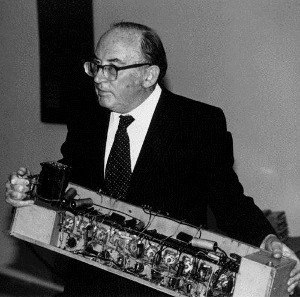This article is more than 1 year old
What it was like to grow up around the world's first digital computers
And build slot machines out of the spare bits
A Darwinist ideas man
The sense of the practical ran deep for Wilkes. Growing up, Wilkes' son Anthony had built many things with his dad, including a telephone that consisted of a bean can with carbon granules for a microphone and a wound coil for an ear piece.
“It worked quite well,” Anthony recalls.
They also constructed an electrical generator used to make a bulb glow. The generator was driven by a very early electric drill - something that would make no sense in real life.
“He was careful to point out the enormous losses in such a procedure!” Anthony says.
Maurice and Anthony talked science, too, but dad was “intolerant if it became too speculative. I remember receiving a cold response from him over an idea I had for a linear gyroscope.”
Ever the mathematician, Wilkes also believed that if you needed a picture or diagram to illustrate your point, then you really had gone too far or – worse in Wilkes' book – the idea had little merit.
“I think he felt that the maths said all that needed saying. Things had no more ‘meaning’ than was there already there in the equations,” Anthony says.
This sense of the practical ran as far as the renaming of the Cambridge computer laboratory - calling it a "laboratory" and not a place for “computer science”.
“He made a distinction between computer technology and science and didn’t like (or choose for his department, or chair) the name ‘Computer Science’. He said he had also been a scientist (at the Cavendish) and knew the difference,” Anthony says.

Sir Maurice Wilkes with a piece of the EDSAC
chassis, photo: Computer Laboratory, University of Cambridge
Wilkes might have been practical but he possessed the necessary creative vision to peek into the future to see what was needed. He had to, given his role leading the computer laboratory. Nowhere did that ability to realize the future manifest itself more than on Titan.
Hartley, who worked on Titan with Wilkes, explains how his supervisor could conceive a direction and push and persuade to get other people there with him - changing history as a result. It was this determination that saw the Titan operating system re-written at the very last minute.
“He would say we are going to do this way. We’d say: ‘You can’t do it,' and he was quite insistent, and you’d do it because of the pressure - firm intellectual pressure.”
With work on Titan nearing completion, Wilkes had been on a visit to MIT where discovered timesharing. This was important, because it meant different jobs could be executed on a computer without waiting for one to finish.
“We were a long way through writing the Titan operating system, and he came back and said we are going do to this way,” Hartley recalls. “We said: ‘It’s too late we are a long way though writing this,'” and he insisted and he insisted. He said this is what the future needs - and he was right. You couldn’t argue and say we don’t have time. We did put time sharing in and it was a huge success.”
Timesharing found its way into mainframes, such as IBM’s hugely successful 360.
According to Hartley, Wilkes would only back ventures he could personally put his stamp on, that he wouldn’t risk having to disown. Not that Wilkes always got his way: he was forced to concede defeat on the Combined Programming Language developed for Titan's commercial implementation, the Atlas Computer. CPL progressed too slowly and was overtaken by history and other languages.
Leader, controller, unwilling to back projects that didn’t pass muster: it's little wonder people could be intimidated by Wilkes.
“He was a formidable person because he’d been there so long,” Hartley tells us of the aura around Wilkes. “When I joined the lab, we were showed around by the head of administration. I was told: ‘We are informal - call everybody by their first names, except Mr Wilkes. He is Mr Wilkes.'"
Anthony also remembers his dad could be “quite severe” and that his friends “tended to be afraid of him.”
Wilkes the man, though, didn’t match the perception and it turns out Wilkes was a good manager and a decent, geek dad.
Wilkes might have pushed and pulled to get his way on projects but he could be engaged and if you could beat his arguments then he’d concede, Hartley tells us. It’s just that often he was right.
Wilkes was also a flexible manager, who worked to the benefit of his students and colleagues.
